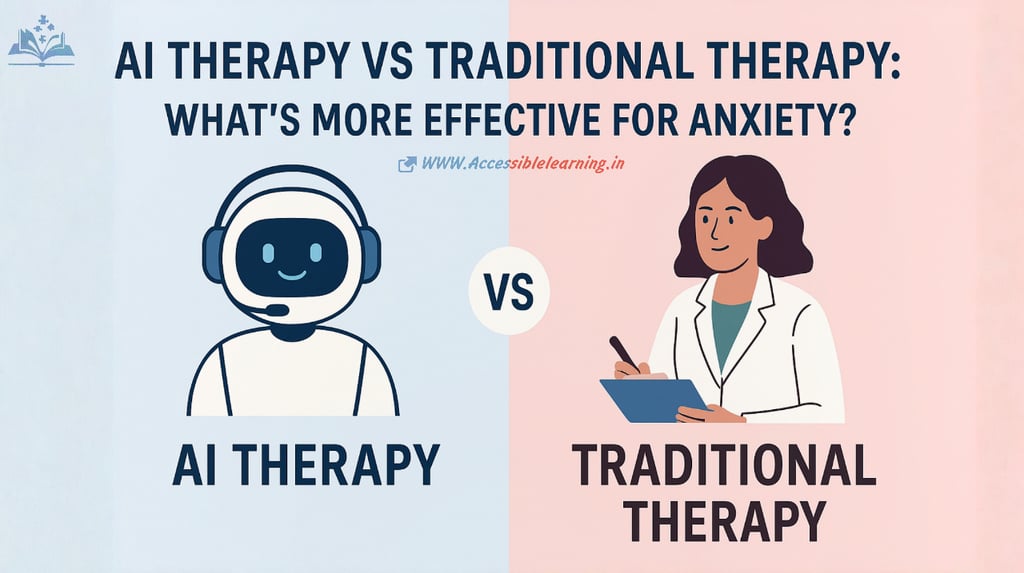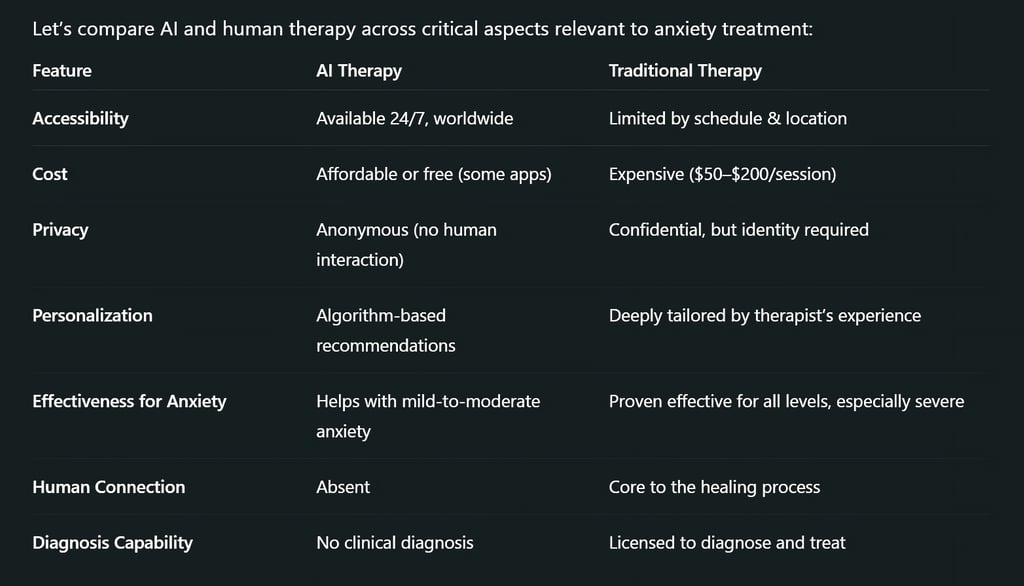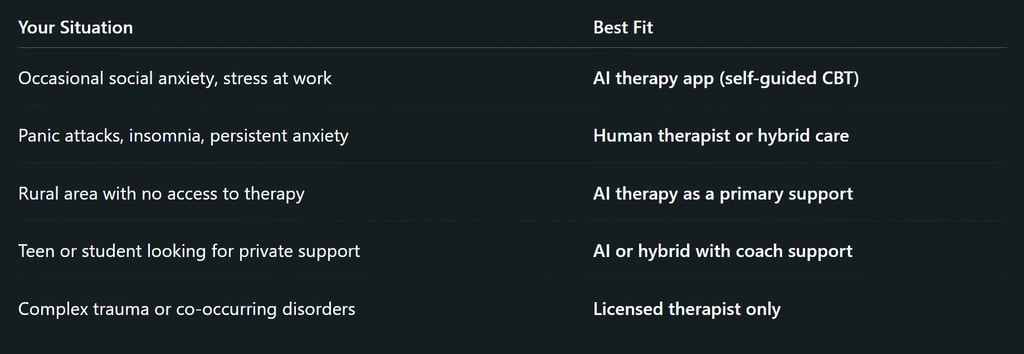
AI Therapy vs Traditional Therapy: What’s More Effective for Anxiety?
Explore whether AI therapy or traditional therapy is more effective for anxiety. Compare benefits, research insights, and what's best for your mental health journey.
AI ASSISTANTHEALTH/DISEASEEDUCATION/KNOWLEDGE
Sachin K Chaurasiya
8/5/20255 min read


In the digital age, mental health treatment is undergoing a major transformation. The rise of AI therapy platforms—powered by advanced chatbots and machine learning—offers new opportunities for addressing anxiety and other mental health conditions. But how do these digital tools compare to traditional therapy methods like cognitive behavioral therapy (CBT) with a licensed human therapist?
This guide explores AI therapy vs traditional therapy, focusing on effectiveness for anxiety, user experience, accessibility, cost, and clinical outcomes.
What Is AI Therapy?
AI therapy, also known as AI-powered mental health therapy, uses artificial intelligence tools such as chatbots or virtual assistants (like Woebot, Wysa, or Youper) to deliver cognitive-behavioral interventions and emotional support. These systems mimic human-like conversations and are trained using natural language processing and psychology frameworks.
Common Features of AI Therapy
24/7 access to mental health support
CBT-based interventions
Journaling and mood tracking
Personalized coaching using AI algorithms
Anonymity and low-pressure environment
What Is Traditional Therapy?
Traditional therapy, also referred to as in-person therapy or talk therapy, involves face-to-face or virtual sessions with licensed therapists. It encompasses multiple modalities, such as
Cognitive Behavioral Therapy (CBT)
Psychodynamic therapy
Humanistic therapy
Mindfulness-based therapy
Therapists provide not only emotional support but also clinical diagnosis and customized treatment plans for conditions like generalized anxiety disorder (GAD), panic attacks, and social anxiety.


What the Research Says: AI Therapy for Anxiety
Recent studies provide encouraging but cautious insights:
A 2023 study published in Nature Digital Medicine found that AI tools like Woebot and Wysa significantly reduced anxiety symptoms over 8 weeks, especially among users with mild or moderate symptoms.
However, meta-analyses show that traditional CBT with a therapist remains the gold standard for long-term anxiety management, particularly in clinical anxiety disorders.
TL;DR: AI therapy is effective for mild-to-moderate anxiety, offering convenience and affordability. But for severe anxiety or complex mental health issues, human therapists still outperform bots.
Voice Search Optimization: Quick Answers
Is AI therapy better than traditional therapy for anxiety?
AI therapy is helpful for managing mild anxiety, but traditional therapy remains more effective for complex or severe anxiety.
Can AI replace human therapists?
Not entirely. AI complements but doesn’t replace the empathy, intuition, and clinical skills of a licensed therapist.
Are AI mental health apps safe and effective?
Many are safe and helpful, especially those using CBT principles, but they are not a substitute for professional diagnosis or emergency support.
Benefits of AI Therapy for Anxiety
On-demand access (ideal for night-time anxiety)
Low cost or free trials
No stigma or judgment
Encourages emotional self-regulation
Helps bridge therapy gaps (waiting lists, rural areas)
Limitations of AI Therapy
Lacks emotional intelligence and deep empathy
Cannot offer emergency intervention
No legal accountability or formal diagnosis
May misinterpret nuanced emotional states

Hybrid Models: The Best of Both Worlds
The future of mental health may lie in hybrid therapy models, where AI tools supplement traditional care. For example:
AI apps provide daily support
Human therapists handle diagnosis and deep therapy
Platforms like Talkspace, BetterHelp, and Ginger are already merging both experiences through AI-assisted matching and therapist chats.
Privacy & Ethical Concerns
Data privacy is a major issue in AI therapy. Users must verify that the app follows HIPAA or GDPR compliance.
AI therapy tools should transparently disclose limitations and not misrepresent themselves as substitutes for human care.
Latest Innovations in AI Therapy (2024–2025)
As AI therapy evolves, it's no longer just text-based chatbots. The latest AI-driven platforms integrate multimodal AI, such as
Voice-based Therapy Assistants
Apps like Kintsugi and Ellipsis Health use voice biomarkers to detect emotional distress through speech tone, cadence, and pauses—offering a more nuanced understanding of anxiety symptoms.
Emotionally Intelligent AI (EI-AI)
Advanced AI models now incorporate affective computing to respond more empathetically, tracking users' moods over time and adjusting conversations accordingly. These systems are moving closer to simulating real emotional validation—although still imperfect.
AI-Augmented VR Therapy
Startups like Oxford VR and Psious are combining virtual reality with AI-driven exposure therapy. This is particularly effective for phobias, social anxiety, and PTSD—where the brain reacts strongly to immersive simulations.
Demographic-Specific Effectiveness: Who Benefits Most?
AI therapy doesn’t impact everyone equally. Here's what the data shows:
Teens & Young Adults (13–25 years)
More comfortable with digital interfaces
Prefer anonymity and on-demand access
Show strong engagement and symptom relief in AI-based CBT programs
Older Adults (50+)
Struggle with digital literacy
Prefer human empathy and conversation nuance
Less likely to engage or trust AI-only solutions
People in Remote or Underserved Areas
AI therapy apps fill mental health deserts
Language models now support multi-lingual CBT, expanding access to non-English speakers
Drop-Off and Retention Rates in AI Therapy
While initial adoption is high due to ease of access, retention and long-term usage remain major challenges:
Studies show 45–60% of users abandon AI therapy apps within the first month.
Common reasons: emotional detachment, lack of accountability, repetitive responses, and a "robotic" feel.
Apps integrating human coach supervision (e.g., Wysa’s human-in-the-loop model) show 30% higher retention.


Regulation, Ethics, and Clinical Backing
As AI tools gain popularity, regulatory bodies and medical institutions are responding:
The FDA has issued SaMD (Software as a Medical Device) guidelines for AI in healthcare, including mental health.
The American Psychological Association (APA) recommends transparency, human oversight, and outcome tracking in AI-assisted therapy.
Some AI therapy platforms now undergo randomized clinical trials (RCTs) to earn mental wellness certifications.
AI in Corporate Mental Health Programs
Major corporations like Google, Accenture, and Unilever have begun integrating AI therapy tools into their employee wellness programs:
Supports burnout, workplace anxiety, and productivity issues
Cost-effective and scalable compared to traditional EAPs (Employee Assistance Programs)
Offers anonymity in environments where stigma is high
Complementary AI Features that Support Anxiety Recovery
Modern AI therapy apps include holistic wellness features:
Breathwork and guided meditations (powered by adaptive AI like Aura or Mindspa)
Sleep tracking with cognitive reframing for insomnia-related anxiety
Daily affirmations auto-generated using NLP models based on the user’s mental state
Human Therapist Collaboration with AI
Some therapists now actively incorporate AI tools in their practice:
Pre-session mood tracking via apps helps therapists prepare more efficiently
Between-session support provided by AI bots improves continuity
Shared data insights help personalize treatment plans over time
Caution Points with AI Therapy (2025 Update)
Despite its promise, professionals caution against over-reliance:
Hallucinations: Some generative models still produce inaccurate or emotionally insensitive responses
Algorithm bias: AI trained on Western datasets may not understand cultural-specific symptoms or expressions of anxiety
Lack of crisis support: AI is not equipped for suicidal ideation or psychotic breaks—prompting the need for robust referral systems


Emerging Alternatives: Community-Based AI Therapy Models
Platforms are now exploring peer-based AI communities moderated by therapists, where AI assists group conversations and emotional check-ins. These models reduce isolation while keeping costs low and support high.
What’s More Effective for Anxiety?
For those with general anxiety or seeking accessible, stigma-free support, AI therapy can be a powerful ally. But if you're dealing with persistent, intense, or complex anxiety, a licensed human therapist will provide deeper, lasting results.
The best choice? It depends on your condition, goals, and comfort level. Many people benefit most from combining both.
Have Anxiety? Consider These Options:
Use Wysa for guided journaling
Try Woebot for CBT-based conversations
Book a session with a licensed therapist if symptoms escalate
Or explore a hybrid model to get the best of both worlds
FAQ's
❓Is AI therapy effective for anxiety?
Yes, AI therapy is effective for managing mild-to-moderate anxiety. Apps like Woebot and Wysa use CBT techniques to provide emotional support, but they may not replace traditional therapy for severe cases.
❓What are the best AI apps for anxiety in 2025?
Top-rated AI mental health apps include Wysa, Woebot, Youper, and Mindstrong. They offer mood tracking, CBT exercises, and anonymous chat-based support.
❓Can AI therapy replace human therapy?
No. AI therapy is a supportive tool but lacks the emotional intelligence, diagnostic ability, and personalization of a licensed human therapist.
❓Which is more affordable: AI or traditional therapy?
AI therapy is significantly more affordable, with many apps offering free or low-cost subscriptions. Traditional therapy can cost $100–$200 per session.
Subscribe To Our Newsletter
All © Copyright reserved by Accessible-Learning Hub
| Terms & Conditions
Knowledge is power. Learn with Us. 📚


